





When the Dutch computer magazine PC-Active switched from diskettes to CD-ROMs for its monthly shareware picks, and most people had made the transition to Windows 3, a regular item on these CD-ROMs was "Oberon games" demos. Since they were demos, which I associate with "half-playable games that are a pain to uninstall", I didn't try them out. Two decades later, when I bought a shiny new Acer laptop with Windows Vista 64-bit, the glittery junk software that is always deleted in short order included "Acer GameZone" and some one-hour game demos linked with the name Oberon: Cake Mania 2, Cooking Dash, Dream Day Honeymoon to name a few. As they were pre-installed anyway, I thought I'd try before trashing. It was my first taste of both time management games and hidden object games. Finally, I picked up some games from a supermarket bargain rack, which had a little "Oberon" logo on the box. Third time's the charm: I was hooked.
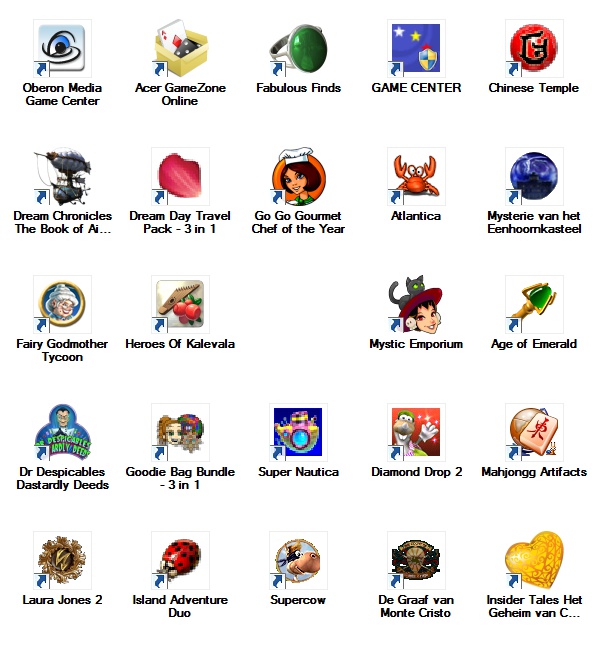
Soon, my computer was taken over by cute little icons.
The games I bought installed more one-hour demos and referred me to the online game sites "Games voor iedereen.nl" (see the links) and the now defunct "Break for Games" website, while the actual games were made by yet other companies. After some surfing, I figured it out: Oberon Media is the umbrella company collecting a large number of very similar games from a variety of gamemakers and selling them from its own game site and through outlets like like Sandlot Games, Acer GameZone, and the two sites mentioned above. This company specializes in "casual games": non-open-ended Flash-like games that are played out in a matter of days, after which new games can be bought cheaply online. And you get what you pay for: the games are never original but always a variation on some existing game, the similar format means "play one, played 'em all", and the translations for the Dutch outlet range from poor to awful: the hidden object games sometimes have incorrect object descriptions, while spoken/written text is stilted.
So, if the games are so unoriginal and recycled, why am I hooked? Because Oberon uses a very simple, successful formula. In today's overcrowded computer game market, games have to be very impressive in both graphics and gameplay to get any attention; they preferably have to be open-ended to keep that attention; and they end up pirated or bitten on the butt by their success because people won't buy new games since they're still enjoying the old ones, or can't afford the hardware that the latest super-duper game requires. This while the revival of retro games shows that the consumer appreciates simplicity. The Oberon games are simple. They go back to the old linear concept: play game, solve game, buy new game. The pricing is low, encouraging buying and discouraging piracy (which doesn't hurt as much for low-priced mass-produced games anyway). The games are designed to make gameplay a satisfying experience. They are relatively easy, which does wonders for my self-esteem. They have beautiful graphics, amusing sound effects and often a historical setting and/or background story to give some meaning to the game. Many are puzzle games, incorporating one or more puzzle game types from the previous pages. In the hidden object genre, my favourite, the rich, lustrous graphics and the ambient background music combine to make a "chill out and enjoy the scenery" game.
The games can be bought online for, on average, $20 or less at Oberon's game site (now CasualGames) or the sites of its affiliates, like Acer GameZone (now I-play), Big Fish Games and the Dutch site "Games voor iedereen.nl". For members - people who subscribe for a monthly game of their choice - the price is on average $10 per game, and the ones I fished from the bargain bin were cheaper still. They can be downloaded as one-hour demos, and activated (the time limit is removed) by a code emailed after payment. Oberon's site has the most titles to choose from, Acer GameZone has a smaller selection but some combi packs that I didn't see on Oberon's, and the Dutch site has the least titles (translated, so I wouldn't want them anyway) but at least it will show the games in alphabetical order for easier browsing. There is a "UK" page on the Dutch site which has more titles (they didn't have to be translated!) and even some titles, like Glyph 2, that I couldn't find on Oberon's site at the time, although it's turned up since then.
Since only Oberon's site had all the Dream Chronicles games at the time, I subscribed for a year at about $7 a month and $7 more for any additional games purchased. Where the demo is downloaded from doesn't seem to matter: I used an activation code from Oberon to register a demo downloaded from Acer GameZone (for a title they both carried, obviously). The Dutch site uses a different system of codes and also installs a "Game Center" to run games from; Big Fish Games does something similar. I'm glad I opted for the main distributor, although I wish (as with all companies I've bought software from) that Oberon would stop spamming me. (At first the handy opt-out button in the mails didn't seem to have an effect, then the spamflood gradually reduced itself to a trickle and dried out.)
Of course, these games need the most generic, widely used platform there is: Windows. The requirements on the box start at "Windows 98SE" (probably for its DirectX version) and go via "Windows 2000" to "XP". The oldest game I bought even needed a CD in the drive, a by now archaic form of copy protection. If the computer has good graphics drivers and the DirectX version is right, they'll work on any current Windows version. The reason given for the one-hour demos is that players can test whether the game works on their computer. All games I've tried so far work on my new-ish laptop under Windows 7. Games may run slowly, though, especially those that use DirectX 8, and they may even hang. My solution (doesn't work for every game!) was to find the game process in the Task Manager and give it a higher priority.
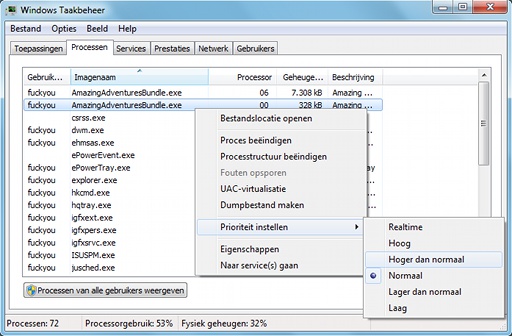
And yes, under Windows, that is my username. Bleep you, Microsoft.
By accident, I've found what slows the system: the default game icons don't point directly to the game executable, but instead to the mechanism that checks whether the demo's time is up yet, and that also displays "other games you might like". This mechanism, which runs as long as the game does, is constantly polling for network connections. Once the demo has been activated by entering the key, this mechanism is no longer necessary, so I change the icon to point to the executable (either "[gamename].exe" or "Bundler.exe") directly, which also means less junk on the screen when starting a game. But since Morrowind seems to be affected by a network-polling process too, all networks under Windows have been deactivated, and are reactivated only when I need to go online to redeem a game. As a result, all games now run smoothly.
If I can't complain about the games' requirements, I do have a problem with the way they install. Unlike most modern Windows users, I like my OS on C: and programs on D: or other logical drives. The oldest game (needing a CD in the drive) asked me on which drive to install, where to put a shortcut in the program menu and whether to add a desktop shortcut. That's how it should be done! The game from "Break for Games" also lets me choose a drive and path, but nothing else, and when I let it install the extra demos, it puts them on the C: drive. "Games voor Iedereen.nl" will let me choose a drive and path for the games and demos, but puts the Game Center that is needed to play all games and keep track of what's registered in "C:\Program Files\OXXOGames", and moving the Game Center to another drive means that some games will no longer start. And even though games can only be run from the Game Center, the installation will still, without asking, clutter the desktop and menu with separate game icons.
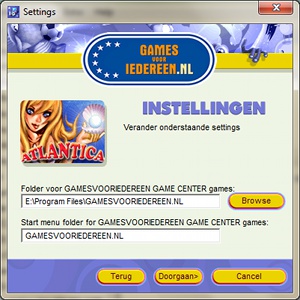
Acer GameZone is even worse, plonking everything on C: and adding shortcuts to the menu - but fortunately only one portal link to the desktop - without asking anything. Oberon, which won't even let me download the whole game for offline installation, but instead downloads a tiny instruction file that then installs the real game while I'm online, and lets me hunt for the installation executable somewhere on the C: drive, does that and worse: I do get an unasked-for desktop game icon, and the only "choice" Oberon offers, and which is ticked by default, is whether to install unwanted spam-enabling junk along with the game.
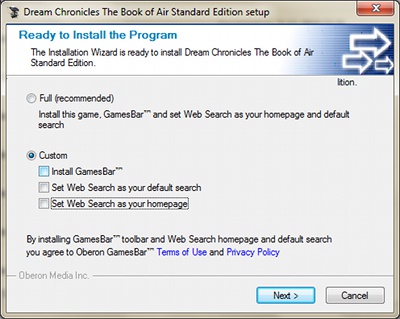
No, a full install should not mean having your browser tampered with.
But then, the main Oberon site seems to be for stupid users who want everything done for them. I've already mentioned the neverending spam mails, but when Oberon Media announced that it was going to move to a different site, it also advised customers to pay for any demos they had installed before their accounts were migrated - I suppose because the demos are hardcoded to connect to the old site when I click the Buy button, and of course I totally could not manually enter the URL of the new site in a browser and look for the game there!
(As my old purchase history vanished after the name change - so if for some reason I needed to reinstall from the CasualGames site a title bought before the switch, I would have to pay for it again - I'm glad I did not follow the above advice. Even if it meant ending up with some demos I could now no longer buy, see below.)
Update: as of autumn 2011, the Oberon site is now called CasualGames, while Acer GameZone has become I-play. And now installs in the same style, see screenshot below. An Oberon install is still messier, though: it disguises what's being installed and how this affects the registry, making it harder to transplant the game to D:, and the screenshot below shows me reinstalling the Acer GameZone (now I-play) version of a game that I'd downloaded from Oberon, tried to transplant, failed, and uninstalled as completely as possible (causing two demo timers to be set to 0 again, a chance for extra screencaps of expired demos), after which I installed and transplanted the I-play version instead.
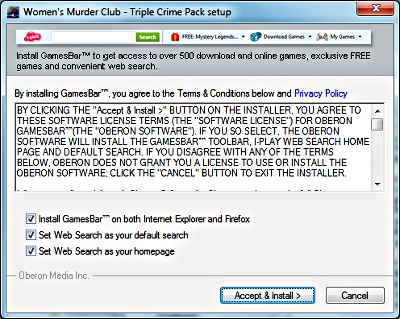
Acer GameZone, how could you.
There is a second reason why Oberon urged its users to pay for demos before the company switched sites: not all games were included in the migration. When I decided to redeem Magic Academy, both it and Fairy Godmother Tycoon were missing on the new site, which meant I couldn't even buy an activation key. No luck either on I-play, but I found both games on the site of Big Fish Games, which is apparently a safety net for old games that are inevitably discarded to make room for the new; I also found Glyph there, but not Glyph II, and only the first two of the three Jewel Solitaire games. Coincidentally, Big Fish Games was offering a special: one game for $2.99 for first-time customers. So I bought Magic Academy there to get to know this site and see if it would be good for future purchases of vintage games.
The most significant difference with Oberon's site is that Big Fish Games charges VAT, turning the $2.99 to $3.56. The second most important difference is that when you buy a game, you don't get a game key, so I couldn't use this purchase to activate the already installed demo. I guess that explains their curious claim that you can keep the games you bought after cancelling your account, as if this were an on-line gaming site; it's not, the game is on my harddrive so of course I can keep it, but apparently some people need this explained to them. What happens is that a "game manager" is installed along with the game, and it keeps track of whether the game is a demo and if so, how much time it has left. The game manager kindly allows the games to be installed on the user's choice of drive, but is itself on C: (C:\BigFishGamesCache, C:\Program Files\bfgclient) so I suspect that if the C: drive were trashed or Windows needs a reinstall, I won't be able to play any more and will have to go to the game site and re-install the game, which automatically installs the game manager, which gets the info of what games I've bought out of my account. (This is a claim I'm NOT prepared to test.)
So, this game site offers a download like Oberon (a small one that, when clicked on, downloads the real installation file, which then has to be hunted down in cache directories - this time, I couldn't find the installation executable at all!) and likewise tries to include an installation CD in the purchase (option ticked by default) which pushes the price up by about $6. And it puts extra game manager software on C: like GamesVoorIedereen.nl, although the game icon it also puts on the Desktop, alongside a big-lipped fish icon leading to "More Great Games", will at least work. Stupid users will be delighted by having the nitty-gritty of software installation so totally hidden from them, but I'm not happy! The account I made is not a membership, but seems to be necessary to reactivate bought games in case of reinstallation. Big Fish Games offers memberships like the Oberon/CasualGames subscriptions, but instead of subscriber exclusives like the many combo packs I've bought, it has punchcards, offering a free game for every [n] games bought, and "collector's editions". Still, given the way its games install and that little VAT surprise, I don't believe I'll be a regular customer.
Most Oberon games fall into either one of the following puzzle game categories: hidden object, match-3, tetris, adapted board or card game, or a combination; or the main non-puzzle category: time management. Other non-puzzle categories are: arcade, side-scroller, simulation game. The graphics also come in different types: painted/photorealistic (perfect for hidden objects), cartoonish like a flash animation (good for the busily animated sprites of time management games), or dopey Pixar-like 3D.
On the following pages are descriptions of the games I've played, grouped by
category, with an explanation of that category at the top (note that these
categories do not necessarily match the categorization on the game sites). Some
are marked "demo", meaning that I only played the demo versions, so there might
be more to the game than I've seen. Screen caps are included when possible, but
mostly in the form of thumbnails: click on the small graphic to see the bigger
one.


